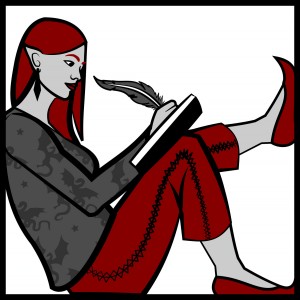
AMY: What does heroism, especially in the context of speculative fiction, mean to you? Does the gender of the hero affect your definition?
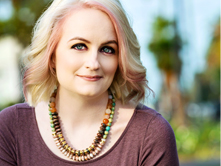
MISHELL: Gender doesn’t affect my definition at all, and my definition seems to differ greatly from Joseph Campbell’s. A hero isn’t someone who has to be dragged reluctantly into doing what’s right even though some prophecy or mentor has laid the path out for them and placed helpful signs along the way. A hero is someone who is told, “You can’t, it’s hopeless, better people than you have failed, turn back now,” and who decides they’re going to ignore all that and do what’s right anyway. Not because they’re confident they can succeed, but because they simply can’t live with themselves if they don’t at least try. That’s the kind of hero we need in a day and age when all the signs are pointing backwards. We need someone whose internal compass points relentlessly forward anyway, someone who ignores official signs and doesn’t wait around for a gold-embossed invitation.
AMY: For readers who haven’t yet read Borderline, Millie is magnificent: a cynical, disabled filmmaker with borderline personality disorder who, much to her surprise, becomes a quasi-detective in a noir-ish, faery-filled Los Angeles. Prior to the opening of Borderline, she attempted suicide, and you’ve mentioned that you wanted, in creating Millie’s story, to depict her phoenix-like rise following that attempt. “I guess you could say she’s given up on giving up.” That determination, that she’s given up on giving up, is so evident in Millie: She’s relentless, despite her ignorance of faery, her endlessly troublesome job, her dysphoria, and a million other things that you throw her way. Why did you want to give Millie this story arc and this determination?
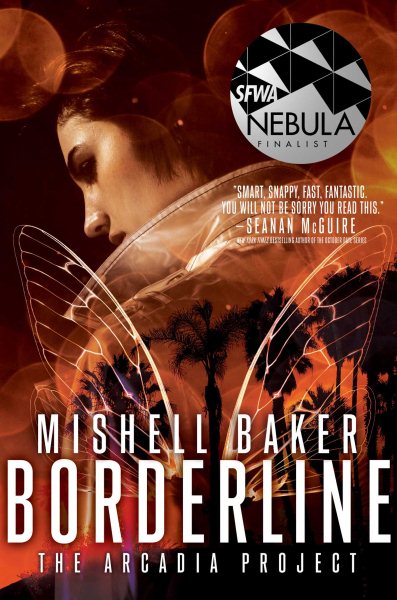
MISHELL: Because I can’t imagine anything more important in life.
Every time I write something, I try to entertain, but I also understand that I have a captive audience for at least a little while, and I want to give them something that will last beyond the several hours or days of escapism I’m naturally also hoping to provide. The books that have meant most to me in my life are those which have saved me the trouble of living through something myself in order to learn from it. We have enough hard lessons in our own lives; sometimes it’s nice to grow as a person simply by reading about what someone else is living through.
Millie’s determination is, at times, the only thing she has going for her, when everything both inside and outside of her seems to be turning against her. We see so many heroes, especially in fantasy, that possess some special power or aptitude that saves them in the end. I wanted to write a story where the “superpower” is simply… survival. Continuing to try, again and again, even when everything repeatedly falls to pieces. Millie does have some assets, to be sure—she’s clever, and gutsy, and knows how to see the humor in situations. But she’s no demigoddess. She just keeps picking herself back up, even when she loses friends, or pieces of herself. And I want anyone who reads my books to carry that idea with them, just in case chaos starts raining down on their own lives. I want them, even if it’s only subconsciously, to have the idea that all they need to do is keep moving forward, and that will be enough to turn a disaster into a good story.
AMY: You’ve spoken at length about how Millie’s borderline personality disorder is surprisingly helpful as she navigates the unknown rules of a fantasy world—and I’ll add, becomes a hero. Would you share a bit about crafting a hero that is so far outside the mold of hypermasculine, sword-and-sorcery stereotype?
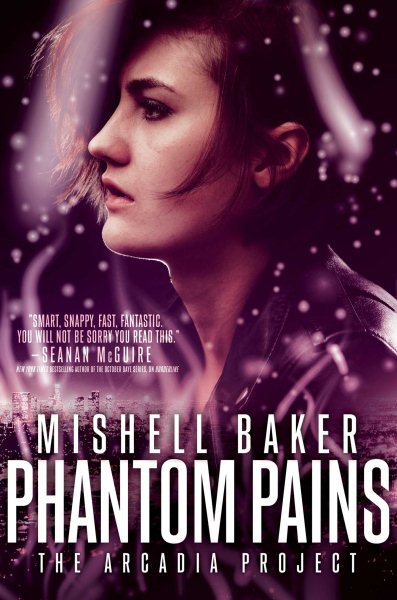
MISHELL: I think it actually came more naturally to me than trying to write a standard hero. Neither I nor anyone I’ve ever been close to has ever done what was expected of them in life or moved smoothly through social situations. In my life history, the people who had the characteristics of the typical fantasy hero were people who ended up very unlikable: the powerful preyed on the weak, the beautiful mocked the ugly, the talented basked in attention and glory while the kids who were struggling got kicked off to the sidelines. So when I pick up a book and the author immediately tries to convince me how beautiful, special, and powerful a character is, my first instinct is to mistrust that character, even resent them.
I’m used to thinking of sympathetic people in terms of how they fail to fit in, how they chafe against the fabric of the society that surrounds them. So if I know I have to cast someone in a role, be it hero, sidekick, or villain, I think my natural inclination is to ask myself, “What is expected of someone in this role, and who would seem to be the worst possible fit?” That’s what interests me the most: watching someone who is forced to do a job they would appear to be terribly suited for, and finding a way to hack their own hidden strengths and find a different way to play the role that is somehow just as effective.
AMY: The pace of your work is full-speed ahead! In many ways, that’s driven by the actions of your main group of characters: They don’t wait, they act. They don’t discuss, they advocate. They don’t dither, they decide. And then I think of something, perhaps related, that you once said in an interview, about how gaming has influenced your writing process: “I’m constantly thinking of the reader as a person who wants to take the wheel. I can’t give readers actual choices in such a linear form, but I can try to imagine what they’d choose, and I can decide at a given point in the story whether it’s best to gratify their desires or frustrate them.” Why are you so focused on reader interactivity? Aside from speed and compulsive readability, what do you think it brings to your work?
MISHELL: I’m an extrovert. It’s a bit of a curse, actually, as a writer, since it’s by nature a solitary profession. But even when I’m writing alone, I’m not alone. I’m always in a sort of conversation with an invisible reader. I can almost hear them yawning if I start to dwell too lovingly on a description or an inner monologue. I feel a constant sense of tension, of push and pull, between myself and this imaginary person who is always just on the verge of wandering off to do something more interesting. “Wait, wait!” I call after them as they start to turn away. And then I make something explode, to bring them back.
A lot of writers say they write for themselves. I’ve been told that’s healthy, and possibly it is. But I have never written for the sake of self-expression. I couldn’t do that any more than I could wander around the house speaking eloquently to empty rooms. I have to imagine that reader. It is interactive from my end from the very beginning, whether I want it to be or not. My measure of success for myself is always the effect on the reader. I don’t care much about purging my inner demons or making myself understood—perhaps decades of therapy have taken care of that urge—I care entirely about creating an experience for another person.
As far as what it brings to my work, I think it affects the way readers view me. I think it’s obvious from the way I write that I’m not reaching for some inner pinnacle of artistic perfection, but reaching outward instead, and readers seem very inclined to reach back. I’ve heard authors urging their readers not to be shy, to get in touch; I’ve never had to do that. My readers seem more-than-usually inclined to contact me online and in person, and that makes me happy.
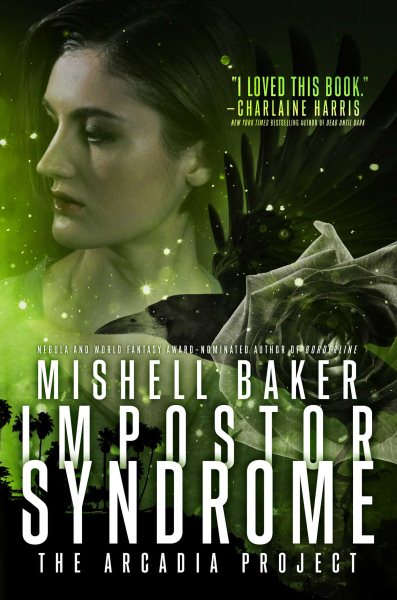
AMY: Once upon a time, I loved Los Angeles—and not so differently, Borderline and its sequels love Los Angeles, a bright, electric, pulsing sort of Los Angeles. Was it important to you that your Los Angeles be so gloriously sentient? And how did you go about getting that vibrancy and that adoration on the page?
MISHELL: This is one of the areas in which I think my BPD actually helps me. I simply describe Los Angeles as I see it, as it makes me feel. I think any writer can manage to translate only a small percentage of their emotion onto the page when they write. I have a theory that since I tend to experience emotions an order of magnitude more intense than that of a neurotypical person, my paltry percentage of expression may come closer to capturing the average person’s entire emotional experience.
To answer the other part of the question, I wanted to make Los Angeles a vivid, breathing character in the story simply because, when I started writing the first book, I had an injury that left me housebound and a new baby that chopped up my mental focus like a tiny Cuisinart. I wasn’t able to do a lot of research on exotic settings and cultures, so I was sort of stuck with trying to take what was immediately around me and make it sing as though it were an alien planet. And Los Angeles, frankly, kind of is. I think you know what I’m talking about.
AMY: Sirens is about discussing and deconstructing both gender and fantasy literature. Would you please tell us about a woman or nonbinary person—a family member, a friend, a reader, an author, an editor, a character, anyone—who has changed your life?
MISHELL: Oh gosh, where to start. One of the things about having BPD, about missing that outer layer of skin over your emotions that most people have, is that you are deeply impressionable, and can be dramatically influenced for good or ill by the people who appear in your life, even briefly. But I’ll choose one, because she’s a fantastic writer in her own right (in both senses of the word) and I truly believe one day I will have to stand in a long line to compete for the honor of being her biggest fan – Wren Wallis.
Before I met Wren I actually had a bit of a fear of other women, an internalized misogyny that came both from media brainwashing and from my unfortunate experiences at an all girls’ private school in the South. I really bought into the destructive messages the media gives us about women and the “false” friendships between them. But about a decade ago I met Wren, and she was the kind of person who calmly stood between me and the people who behaved as my high school classmates had. Wren’s patience, honesty, loyalty, and genuine love for humanity with all its flaws forced me to rethink the stereotypes I’d been fed.
The irony is that I initially met her online and the only reason I had the courage to befriend her in the first place was that I thought she was a man. I’m glad I made that mistake. Now she’s like a sister to me, and my friendship with her ended up being the “gateway drug” to many fulfilling relationships with people of all genders. Maybe this isn’t the flashiest answer I could have given, but sometimes it’s the quiet people, the ones who rarely draw attention to themselves, who can have the greatest impact on a life.
Mishell Baker is a 2009 graduate of the Clarion Fantasy & Science Fiction Writers’ Workshop. Her short fiction has appeared in Beneath Ceaseless Skies, Daily Science Fiction, Redstone Science Fiction, and Electric Velocipede. Her urban fantasy series The Arcadia Project, released by Simon & Schuster’s Saga imprint, includes Borderline, Phantom Pains, and Impostor Syndrome. The series is narrated by Millicent Roper, a snarky double-amputee and suicide survivor who works with a ragtag collection of society’s least-wanted, keeping the world safe from the chaotic whims of supernatural beasties. When Mishell isn’t convention-hopping or going on wild research adventures, she lives in Los Angeles with her co-parent and two changelings.
For more information about Mishell, please visit her website or her Twitter.







Connect with the Sirens community
Sign up for the Sirens newsletter